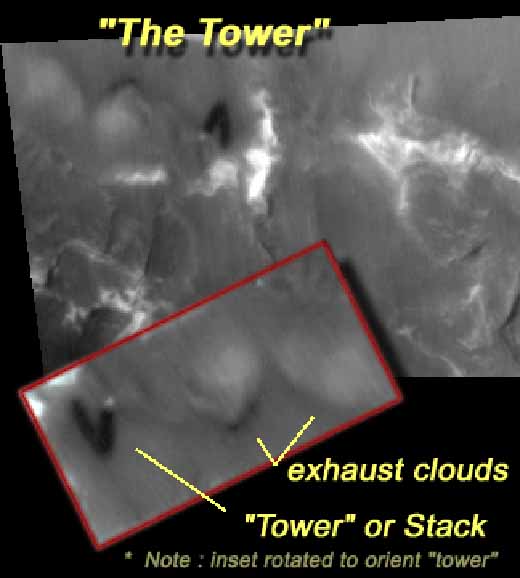|
The inverted "V" is confusing when viewed as orientated in
the original image. However, when rotated to orient the primary feature
of the "V" to a vertical position (see inset in image above)
, this "V" is more clearly an enormous monolith --- a great
TOWER casting a long shadow over the Martian topography. In the inset
this "Tower's" shadow is cast from the base of the tower backwards
to about the "10 O'clock" position. The Tower's shadow joins
the tower itself at its base, where the tower rests on the topography,
as it should. The Tower's shadow is quite clearly diffuse whereas the
Tower itself has much more sharp boundary lines. The Tower's edges having
a slight reflective quality to them, most evident where the tower and
shadow meet..
"The Tower's scale as seen from above, its horizontal presentation of
its vertical scale due to the angle of the image, is an astonishing
6.3 Kilometers! The object itself is obviously considerably larger than
this because we only see that portion of its which is inclined to the
camera due to the angle of the image; the estimated height is only the
horizontal translation of its vertical scale due to a 3 degree angle
of inclination of the Mars Orbital Camera diverted from a straight down
shot.
Even at the conservative 6.3 Kilometers this object dwarfs the Empire
State Building <381 meters> by more than 16 times and the Taipei Financial
Center <508 meters>, the tallest building in the world, by more than
12 times!!!!
Perhaps even more stunning than the shadow itself are the clouds trailing
down wind from the "Tower". On closer inspection you will
note that the tower has slight whitish lines emanating from the white
mark at the Tower's top and expanding in the direction of the clouds.
These clouds are from "exhaust" coming from what is essentially a "smoke
stack". The cooling of this exhaust in the cold Martian air leads
to the exhaust able to hold less moisture. The exhaust becomes saturated
as it cools and the moisture condenses out on dust particles which form
these clouds. The most proximal cloud to the "Tower" demonstrates more
well defined and curved leeward <down wind> edge do the the pressure
of the movement in that direction. The cloud more distant from the Tower/Stack,
seen near the edge of this image, shows more diffuse boundaries as wind
has cause the cloud to dissipate and break up. Both of these clouds
show slight undershadowing, as is common..
The Tower is in fact a "smoke stack"
and is giving off *STEAM*!!
MARS not only was inhabited
"at one time" but is inhabited *NOW* and this Tower
was FUNCTIONING as our Mars Orbital Satellite passed over head!!!!!
The "Tower" is part of of broader investigation of the same area in the "Lagoon, Ridge & River" presentation.
*** NOTE ***
IF you spend the time to examine this whole image at MO3-00946
, as you should, you may discern an apparent discrepancy in the
lighting of the topography. Specifically, the shadow given off
by the Tower appears to conflict with apparent lighting of the
talus cones seen in a horizontal line along the lower edge of
the image. In actuality there is no shadow discrepancy: the sun
is at such a height that its light is able to reflect on the broad
slopes of the talus cones and "refract" back at the
camera *as if* these talus cones were being lit from a southerly
direction. There is no shadow discrepancy in this image
|
|


